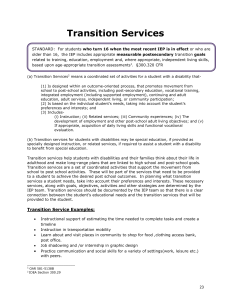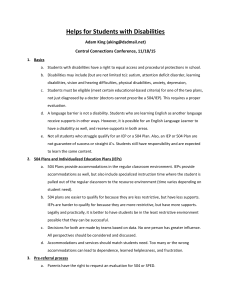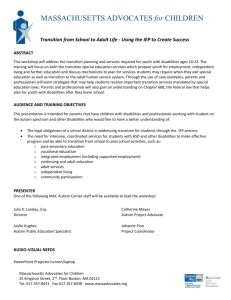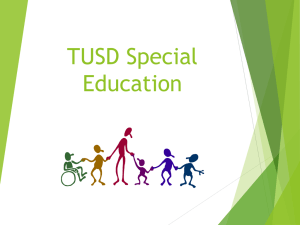Six Principles of IDEA August 2013
advertisement
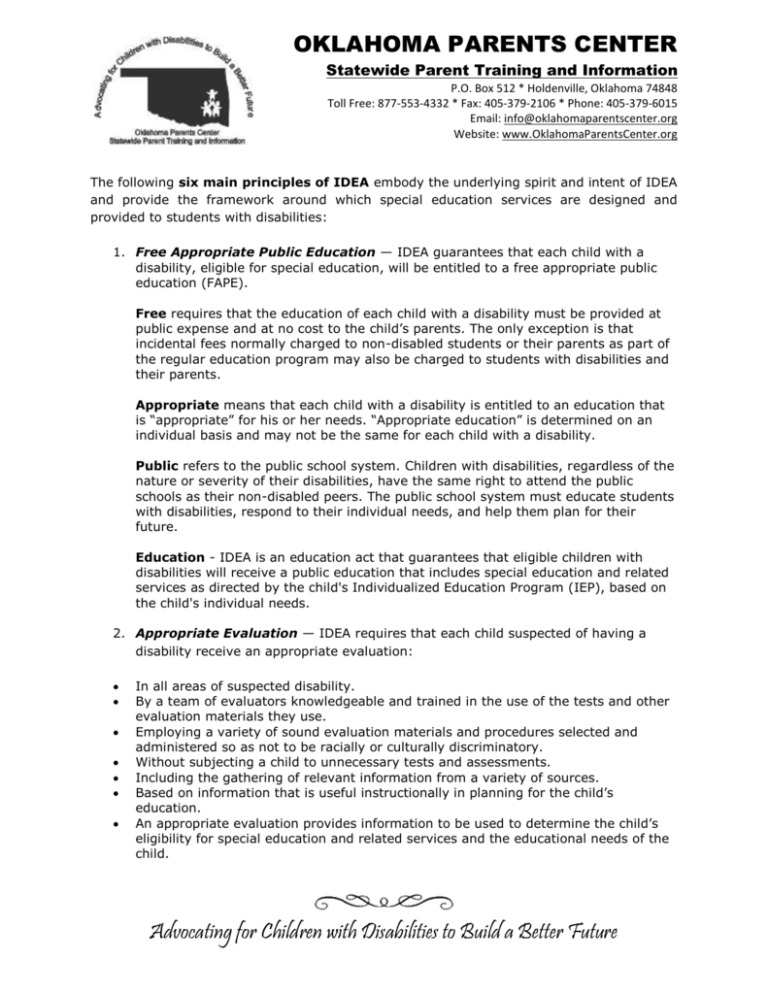
OKLAHOMA PARENTS CENTER Statewide Parent Training and Information P.O. Box 512 * Holdenville, Oklahoma 74848 Toll Free: 877-553-4332 * Fax: 405-379-2106 * Phone: 405-379-6015 Email: info@oklahomaparentscenter.org Website: www.OklahomaParentsCenter.org The following six main principles of IDEA embody the underlying spirit and intent of IDEA and provide the framework around which special education services are designed and provided to students with disabilities: 1. Free Appropriate Public Education — IDEA guarantees that each child with a disability, eligible for special education, will be entitled to a free appropriate public education (FAPE). Free requires that the education of each child with a disability must be provided at public expense and at no cost to the child’s parents. The only exception is that incidental fees normally charged to non-disabled students or their parents as part of the regular education program may also be charged to students with disabilities and their parents. Appropriate means that each child with a disability is entitled to an education that is “appropriate” for his or her needs. “Appropriate education” is determined on an individual basis and may not be the same for each child with a disability. Public refers to the public school system. Children with disabilities, regardless of the nature or severity of their disabilities, have the same right to attend the public schools as their non-disabled peers. The public school system must educate students with disabilities, respond to their individual needs, and help them plan for their future. Education - IDEA is an education act that guarantees that eligible children with disabilities will receive a public education that includes special education and related services as directed by the child's Individualized Education Program (IEP), based on the child's individual needs. 2. Appropriate Evaluation — IDEA requires that each child suspected of having a disability receive an appropriate evaluation: In all areas of suspected disability. By a team of evaluators knowledgeable and trained in the use of the tests and other evaluation materials they use. Employing a variety of sound evaluation materials and procedures selected and administered so as not to be racially or culturally discriminatory. Without subjecting a child to unnecessary tests and assessments. Including the gathering of relevant information from a variety of sources. Based on information that is useful instructionally in planning for the child’s education. An appropriate evaluation provides information to be used to determine the child’s eligibility for special education and related services and the educational needs of the child. Advocating for Children with Disabilities to Build a Better Future OKLAHOMA PARENTS CENTER Statewide Parent Training and Information P.O. Box 512 * Holdenville, Oklahoma 74848 Toll Free: 877-553-4332 * Fax: 405-379-2106 * Phone: 405-379-6015 Email: info@oklahomaparentscenter.org Website: www.OklahomaParentsCenter.org 3. Individualized Education Program (IEP) — In order to ensure that students with disabilities receive an appropriate and individualized education, IDEA requires that, after drawing upon current evaluation information, the IEP team develop a written document, the IEP, designed to meet the unique educational needs of each student with disabilities. IDEA contains clear language about: The information which the IEP must contain. Who develops the IEP. The public agency’s obligation to provide the special education and related services identified in the IEP. 4. Least Restrictive Environment (LRE) — IDEA guarantees that a child with a disability will receive a free appropriate public education in the least restrictive environment (LRE) appropriate. This principle reflects IDEA’s strong preference for educating students with disabilities in general education classes with the access to general education curriculum. Placement in the general education classroom is the first placement option the IEP team must consider. When considering placement in the general education classroom, the team is required to explore the range of modifications and supplementary aids and services that are needed to ensure that the student can receive a satisfactory education in the general education classroom. If the IEP team determines that the student can be appropriately educated in the general education classroom using modifications/supplementary aids and services, this is the LRE for that particular student. However, the IEP team may determine that the student cannot be educated satisfactorily in the general classroom, even with the provision of modifications and supplementary aids and services. The team must then consider other placements outside of the general classroom in order to provide FAPE for the child. The range of such placements that each school system is required to have available is commonly referred to as the “continuum of alternative placements.” Thus, like all other components of a student's special education, the LRE must be determined for each student based upon that child’s individual needs. 5. Parent and Student Participation in Decision Making — This principle reinforces the belief that the education of children with disabilities is made more effective by strengthening the role of parents in the special education process. IDEA requires that parents (and students, as appropriate) participate in each step of the special education process. Students must be invited to participate in IEP meetings where transition services are to be discussed. Parent involvement includes: Equal partnership in the decision-making process. The right to receive notice. The right to give consent for certain activities such as evaluations, changes in placement; and release of information to others. Advocating for Children with Disabilities to Build a Better Future OKLAHOMA PARENTS CENTER Statewide Parent Training and Information P.O. Box 512 * Holdenville, Oklahoma 74848 Toll Free: 877-553-4332 * Fax: 405-379-2106 * Phone: 405-379-6015 Email: info@oklahomaparentscenter.org Website: www.OklahomaParentsCenter.org The right to participate in all meetings concerning their child's special education. 6. Procedural Safeguards — Procedural safeguards are a set of activities whose purpose is to ensure that: The rights of children with disabilities and their parents are protected. All information needed to make decisions about the provision of a free appropriate public education to the student is provided to parents of children with disabilities and to the student when appropriate. Procedures (mediation and due process) are in place to resolve disagreements between parties. Some procedural safeguards under IDEA include the right of parents to: Inspect and review their child’s educational records. Obtain an independent educational evaluation (IEE). Be given written prior notice on matters regarding the identification, evaluation, or educational placement of their child. Request mediation and an impartial due process hearing. Be given a full explanation of all of the procedural safeguards under IDEA and State complaint procedures. Appeal the initial hearing decision to the State Education Agency (SEA) if the SEA did not conduct the hearing; (also the right of the public agency). Have child remain in his/her present educational placement, unless the parent and the public agency agree otherwise, while administrative or judicial proceedings are pending. Bring a civil action in an appropriate State or Federal court to appeal a final hearing decision; (also the right of the public agency). Request reasonable attorney’s fees from a court for actions or proceedings brought under the IDEA under certain circumstances. Give or refuse consent before their child is evaluated or reevaluated. Participate in (and in some cases to appeal) discipline decisions regarding students with disabilities Advocating for Children with Disabilities to Build a Better Future

